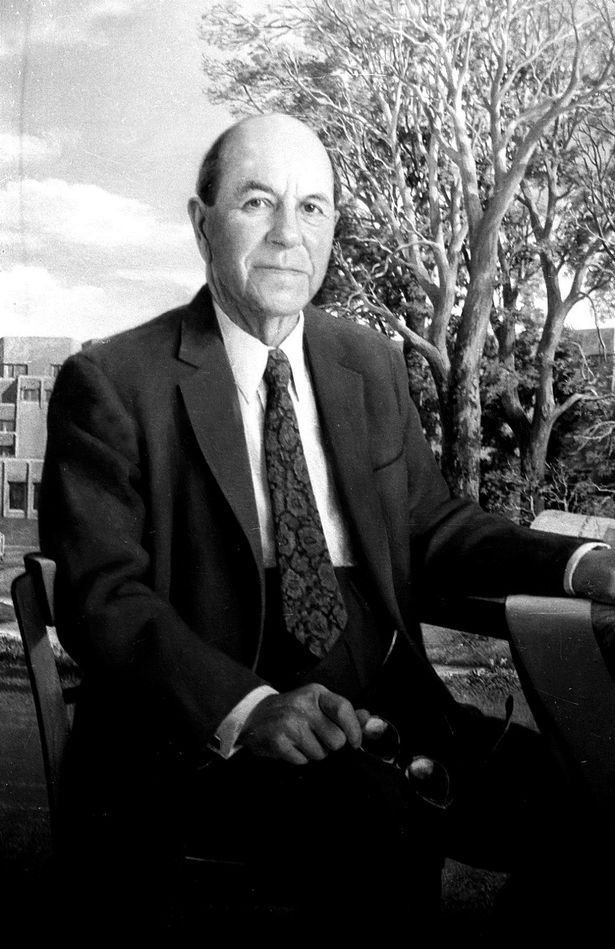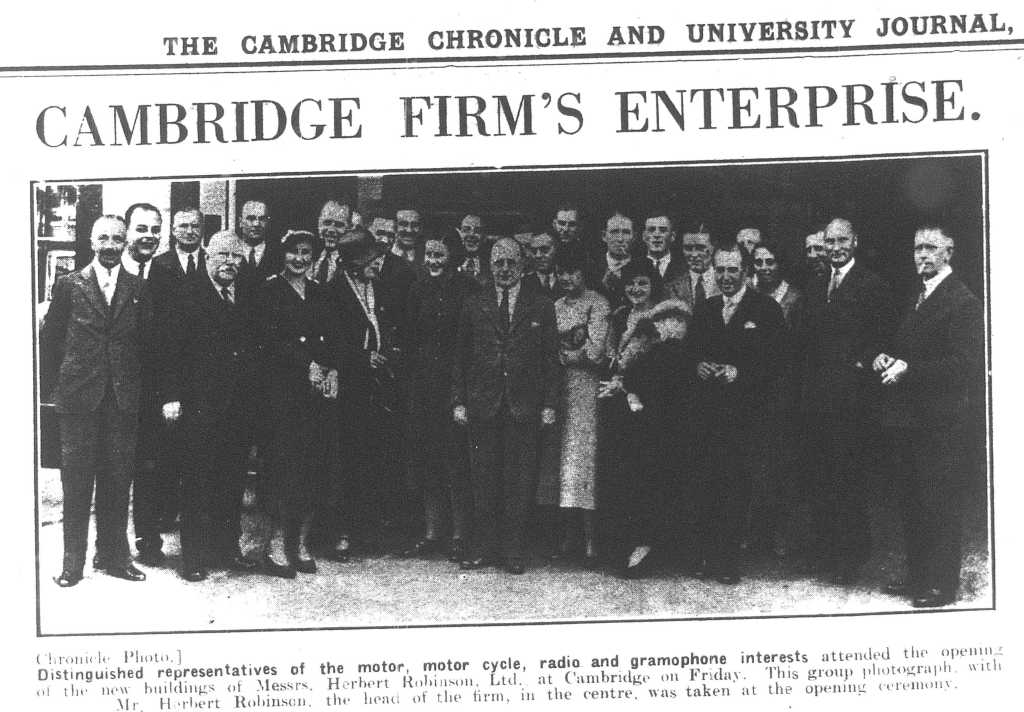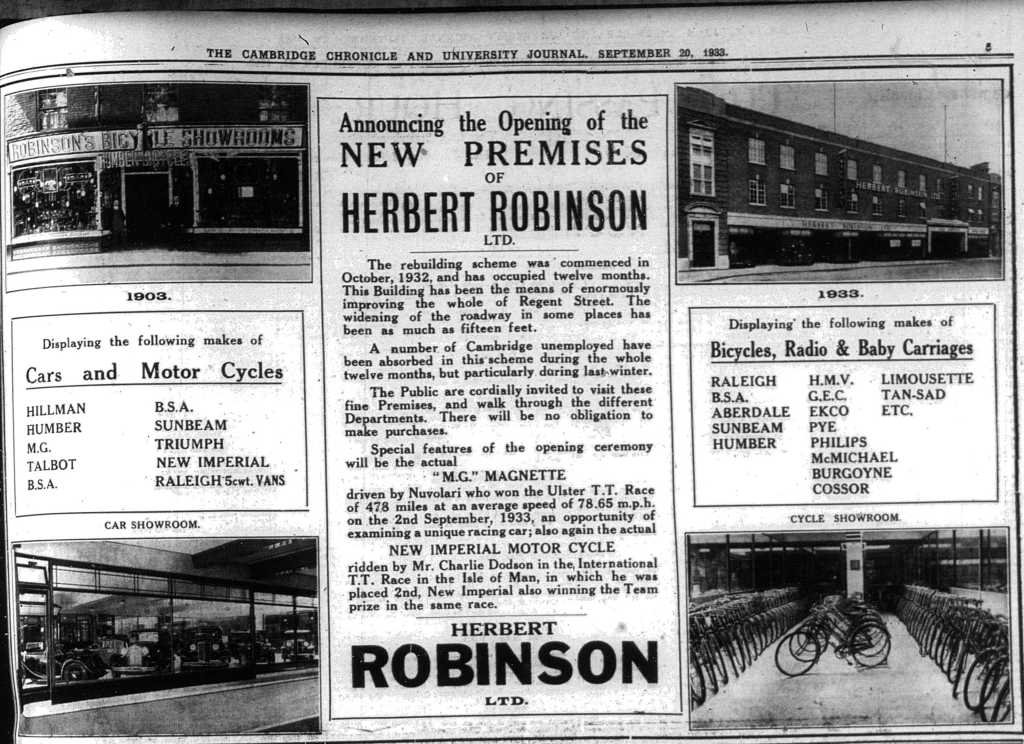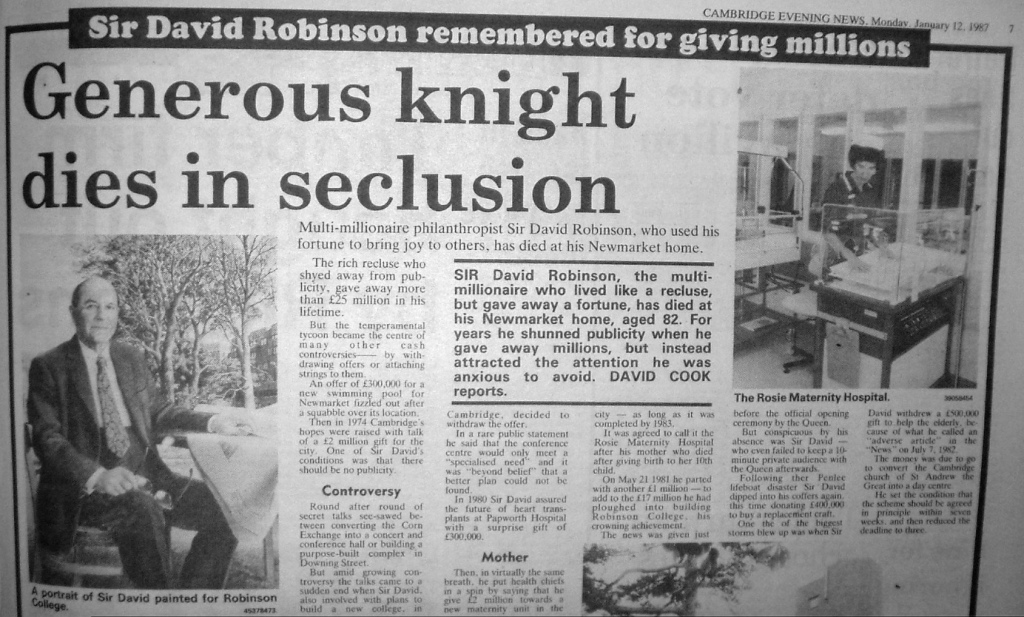Sir David Robinson might not be a familiar name to most of you, but for anyone born in Cambridge after 1985, chances are you were born in the maternity hospital that he paid for.
I’ve been meaning to write a post about him only I had no idea which newspapers of which dates contained detailed articles about what he did in for Cambridge while he was alive.

Robinson College, Cambridge has a short biography of their founder who gifted £18million. The college opened in May 1981. Sir David was a very, very distant relative of mine by marriage. One of his nephews, James married my mother’s elder sister, Jennifer. Both were present at the opening of the college. It was the first time I had seen photographs of The Queen taken by members of my family. As a young child I met Sir David’s sister – James’s mother, in the mid-1980s, but never met the great man himself.
At the time both Jennifer and James lived in a small village just outside Stevenage, but were regular visitors to Cambridge throughout the 1980s and 1990s. Every summer throughout our childhood we would go and stay with them for a week or two – giving my parents some respite from us four siblings. For most of that time, James would book most of that time off work to be at ours and the village’s disposal, even though he was the managing director of a London-based business travel firm. One of the things I noticed with a number of the successful business-running families was that they all knew where to draw the line to stop their work taking over their lives.
Tragically Jennifer died of breast cancer in the mid-1990s. A few years later, James emigrated to Australia, but still returns on family visits to see ourselves and his Robinson cousins. every other year.
Herbert Robinson – one of the great motoring and cycling proprietors in 20th Century Cambridge
Despite radio adverts for Herbert Robinson motors being on local radio throughout the 1980s and 1990s – one being an excruciating impersonation of Smith and Jones trying to pronounce Herbert Robinson but calling him “Hervey Rogerson” – I never clocked that this was the grandfather of my uncle James. We were however aware of the very distant family link to the Rosie Maternity Hospital when it opened in the mid-1980s in Cambridge.


As you can see above, Herbert Robinson built and occupied one of the most prominent business premises on Regent Street in Cambridge – today the headquarters of Cambridge City Council’s Housing Services. It was at this time a number of old premises were being demolished throughout Cambridge to make way for new retail-friendly premises built in a similar style. With this one however, Herbert Robinson built an underground floor in this modern, steel-framed building that served as an air-raid shelter during WW2.
David Robinson’s younger days
Born in 1904, David attended what was the Cambridgeshire County High School for Boys on Hills Road – today’s Hills Road Sixth Form College. This is the same school that Brinley Newton-John (Olivia’s dad) featured in my previous blogpost, was the headmaster of before the family emigrated to Australia. Their times did not cross, however.
David Robinson’s fortune – Robinson Rentals.
David Robinson made his fortune renting out electrical goods in the 1950s at a time many families could not afford to purchase outright. Various articles also note that such was the limited reliability of some of the products that at the time it made more sense for most families to rent rather than buy. Interestingly there was a similarly-named firm called Radio Rentals founded by a Joseph Robinson, which was just as successful. I’ve not yet worked out if the two were brothers/cousins or not related at all.
Following the sale of his firm to Granada, he moved into horse racing to become one of the biggest names in the industry. In 2004, the Racing Post Newspaper celebrated the centenary of Robinson’s birth in this article, detailing his achievements in the industry. It has been transcribed here.
Described as publicity-shy in contemporary newspaper reports from his later years, he donated the vast majority of his financial wealth to municipal and civic projects. In fact the proportion of the wealth that he had given away by the time of his death is astonishing. His obituary in the Cambridge Evening News of 12 Jan 1987 calculates the figure at £25million. (Which is about £71million in today’s money according to the Bank of England’s inflation calculator). This compares with his wealth on his death listed at £1,385, 347 in the Oxford Dictionary of National Biography. So he had given away 95% of his wealth by the time he died.
Much of that went on the founding of Robinson College (£18million) and the Rosie Maternity Hospital (£3million). The story of his intervention in the saga of a new maternity hospital is particularly moving.
Government delays in funding a new maternity hospital for Cambridge
The official history of the Rosie cuts a very long story short, Chris Elliott of the Cambridge News added some further information from that newspaper’s archive here. In the early 1960s shortly after The Queen opened what was then known as the New Addenbrooke’s site (because the Old Addenbrooke’s – now the Judge Institute, opposite the Fitzwilliam Museum was still in use), the Department for Health agreed to move the old Mill Road Maternity Hospital to a new site. This, according to the official Rosie history should have been completed by 1975, but the economic crises of that decade put paid to this.
By 1980 things looked particularly bleak. It was here that Robinson stepped in. On hearing that it would not be another decade before a new maternity hospital was completed, he offered to pay for the cost of the hospital in full. But there was a catch. They had to have it built in less than half the time. Robinson more than most knew of the importance of excellent maternity services. His mother, Rosie, died in childbirth. Hence his urgency to get it built.
“David Robinson did not think Cambridge’s expectant ladies should have to wait that long, so he stepped in and made his gift, on the condition that work began without delay, and that the new hospital was opened quickly too.”
“David Robinson did not think Cambridge’s expectant ladies should have to wait that long, so he stepped in and made his gift, on the condition that work began without delay, and that the new hospital was opened quickly too.” Chris Elliott in the Cambridge News – 11 Dec 2016
The maternity hospital was completed on time, and David Robinson received a well-deserved knighthood.
Robinson also paid for a new wing at the old Evelyn Hospital – where I used to deliver newspapers to after school in the early 1990s. Furthermore, he returned to his old school to get a small theatre built. In the mid-1990s I found myself on that stage in my first term of lower sixth as I took on far too much and burnt the candle at both ends.
The concert hall that never was
I was appalled to find out that Cambridge councillors ended up spurning the offer of a new concert hall for Cambridge – something I have persistently called for in recent years. As was with his nature, one of his conditions was no publicity. It’s a trait that perhaps doesn’t sit easily in our celebrity-and-brand-obsessed age where big businesses insist on having their branding splattered all over the place in return for their sponsorship – as I saw for myself at London 2012. Furthermore it was at a time that Cambridge’s social venues were falling like skittles in the postwar era as people’s social habits changed, and previous areas of poor quality dense housing were cleared, and populations moved out to new council estates on the edge of town. It would not be until 1986 that the Cambridge Corn Exchange re-opened as a concert venue, and The Junction opened as a youth arts venue on the back of some very violent direct action by local teenagers and young people after years of peaceful protesting had gotten nowhere. A pattern that has a curious habit of repeating itself throughout history.
As I’ve mentioned before, Sir David Robinson deserves to have a proper historical biography written about his life and achievements. He reinvested the profits that he made back into the towns and cities which made him his wealth, and did not seek the limelight in return. Just well-run municipal facilities for the benefit of the people.
Other businessmen before him have contributed towards the city of Cambridge – Sir Horace Darwin, Robert Sayle, Eaden Lilley, Howard Mallett and Charles Kelsey Kerridge to name but a few. But Sir David Robinson was in a league of his own. It’s time our city recognised his contribution – and also for those that have made their fortunes in our city since his death seek inspiration from his example and invest not just in Cambridge but in our surrounding towns as well.

With thanks to Mike Petty MBE for finding and digitising the original newspaper obituary.
I have read with interest your dealited account of our family and i thank you for that.
However there are two of us who still live in Cambridge and we are direct relations to Sir David and my Grandfather who was Sir Davids Brother. My Aunt is the youngest daughter of Nesbit Robinson ( Davids brother) and then there is me the oldest grandson . So we are stiil out there !!
LikeLike